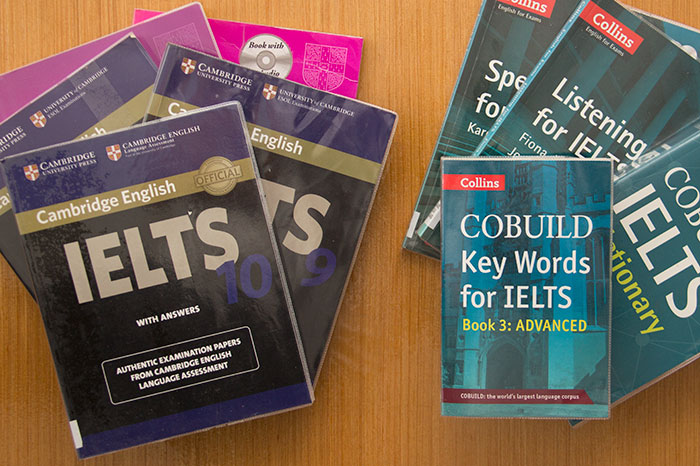Books for IELTS
As I recently took the IELTS test, I thought it would be a good idea to talk about the books for IELTS, as I did spent a lot of time browsing through them and making practice tests. Furthermore, if you want to read about my test and my experience, check my Band 8 IELTS Academic post on my lifestyle blog.
If you are on my blog, reading about books for IELTS, I assume you already know about the test, so I will not make a description of it. You might also be aware of the price tags these books have. While you might get the COBUILD Key Words for IELTS at less than £10, the others are expensive. Around £13 to £14 for a Collins books and you need four, one for each part of the test: Listening, Reading, Writing, and Speaking. As you can see, it can easily add up.
The other books that are available are the Cambridge student books with four authentic examination papers each. Unfortunately these are over £20 for an old one (goes up to £30 and £40 if you get it from a book shop and if the books are newer). So, my first suggestion is to do like I did and borrow them from the library. It’s unlikely you will need them again, even if you retake the IELTS in a few years, you will save a lot of money. I’m a member of two different public libraries in Liverpool and I borrowed from both of them. If you are borrowing, please make sure you are returning the books as soon as you took the test, so others can borrow them as well.

I will start by talking about the Collins books. My suggestion is to start with the key words for IELTS and, depending on your aims, to pick one of three versions: Book 1 Starter (4-5.5), Book 2 Improver (IELTS 5.5-6.5), Book 3 Advanced (IELTS 7+). I picked Advanced and I read the list of words they were suggesting in the first pages, by topic. It was soon clear that I shouldn’t spend more time trying to build up vocabulary as, from all the words, I looked up only one word, aural, because I thought it was more precise than “something related to the ear”. I did learn though that aggregate applies to economy as well and it’s not only a construction material, as I knew. If you see, after reading those 10 pages or so that you have difficulties with words you know you need to study that. If not, you will save lots of time by not focusing on something you already know.
The other books from Collins are really good as well. For Listening there are all sorts of examples and you can also do a bit of practice. It’s important to familiarize yourself with the kind of questions that are used in the IELTS test. After you finish these books, go to the other ones, with the authentic papers.
My suggestion is to have practice tests for the parts you think are a bit tricky for you. I did a lot of practice tests for the Speaking part of IELTS. I did that because some of the questions are not Academic at all and I didn’t want to be unprepared if I got one of these questions. For example, describe a party or talk about a child.
Before taking the test, make at least 3 practice tests. I did 5. I followed exactly the timeline of how the real tests are done, but I allowed myself only 45 minutes instead of 1 hour for Reading and Writing, as, during the exam, I would be stressed, so I needed to recreate the pressure while practising. So, during these practice tests, I’ve started with Listening, followed by Reading, and then Writing, without any breaks in between. Write the answers in a notebook and look over it again, before the test. That way, you know where your weaknesses are, and you can pay more attention to those during the test.
Do not use your phone to keep track of the time. You’ll not be allowed with the phone in the test taking area, and it might distract you as well. I bought some cheap timers and I will use those when I’m cooking and baking.
If you try to make your test practice experience as close as the one of the real exam, it will be easier that way.
The last mention I’m going to make is about the Cambridge IELTS exam papers. Your library might stock only very old ones, from 10 years ago. Don’t worry about it. The test is given in the same way today as it was given 20 or 25 years ago (I can’t remember exactly, but at least 20).
If you are taking IELTS Academic I wish you good luck. If you have any questions about the test, please ask and I will reply as soon as I can.
